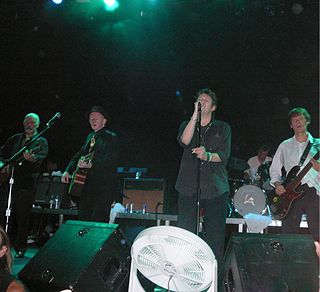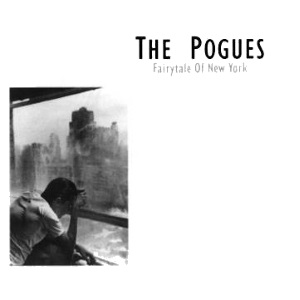"The Rare Old Mountain Dew" is an Irish folk song dating from 1882.
"The Rare Old Mountain Dew" is an Irish folk song dating from 1882.
"The Mountain Dew" was a song about poitín (Irish moonshine) with lyrics by New York musical theater great Edward Harrigan and music credited to Harrigan's orchestra leader David Braham. The tune, however, owes an obvious debt to the older song "The Girl I Left Behind."[ according to whom? ] It was first performed as part of the 1882 Harrigan production The Blackbird. [1] and was later printed in Colm Ó Lochlainn's 1916 Irish Street Ballads. The earliest recording in the 78 rpm era was made in New York in 1927 by John Griffin for the Columbia label. Some later recordings used the title "The Rare Old Mountain Dew."
The song is referenced in The Pogues' song "Fairytale of New York":
And then he sang a song
The Rare Auld Mountain Dew
I turned my face away
And dreamed about you.
Lilting is often added to the song, either after every second verse or once at the beginning and once at the end, to the same tune as the lyrics. While these vocables vary with the singer, one typical version is "hi dee diddley idle dum, hi dee doodle dydle dum, hi dee doo dye diddly aye day", repeated once.

The Pogues were an English or Anglo-Irish Celtic punk band fronted by Shane MacGowan and others, founded in King's Cross, London, in 1982, as Pogue Mahone—an anglicisation by James Joyce of the Irish phrase póg mo thóin, meaning "kiss my arse". Fusing punk influences with instruments such as the tin whistle, banjo, cittern, mandolin and accordion, the Pogues were initially poorly received in traditional Irish music circles—the noted musician Tommy Makem called them "the greatest disaster ever to hit Irish music"—but were subsequently credited with reinvigorating the genre. The band later incorporated influences from other musical traditions, including jazz, flamenco, and Middle Eastern music.
"Whiskey in the Jar" is an Irish traditional song set in the southern mountains of Ireland, often with specific mention of counties Cork and Kerry. The song, about a rapparee (highwayman) who is betrayed by his wife or lover, is one of the most widely performed traditional Irish songs and has been recorded by numerous artists since the 1950s.

The Dubliners were an Irish folk band founded in Dublin in 1962 as The Ronnie Drew Ballad Group, named after its founding member; they subsequently renamed themselves The Dubliners. The line-up saw many changes in personnel over their fifty-year career, but the group's success was centred on lead singers Luke Kelly and Ronnie Drew. The band garnered international success with their lively Irish folk songs, traditional street ballads and instrumentals. The band were regulars on the folk scenes in both Dublin and London in the early 1960s, and were signed to the Major Minor label in 1965 after backing from Dominic Behan who was paid by Major-Minor to work with the Dubliners and help them to build a better act fit for larger concert hall venues. The Dubliners worked with Behan regularly between 1965 and 1966; Behan wrote numerous songs for this act including the song McAlpine's Fusiliers created specifically to showcase Ronnie Drew's gravel voice. They went on to receive extensive airplay on Radio Caroline which was part-owned by Phil Solomon CEO of Major Minor, and eventually appeared on Top of the Pops in 1967 with hits "Seven Drunken Nights" and "The Black Velvet Band". Often performing political songs considered controversial at the time, they drew criticism from some folk purists and Ireland's national broadcaster RTÉ had placed an unofficial ban on their music from 1967 to 1971. During this time the band's popularity began to spread across mainland Europe and they appeared on The Ed Sullivan Show in the United States. The group's success remained steady right through the 1970s and a number of collaborations with The Pogues in 1987 saw them enter the UK Singles Chart on another two occasions.

If I Should Fall from Grace with God is the third studio album by Celtic folk-punk band the Pogues, released on 18 January 1988. Released in the wake of their biggest hit single, "Fairytale of New York", If I Should Fall from Grace with God also became the band's best-selling album, peaking at number three on the UK Albums Chart and reaching the top ten in several other countries.
"Follow Me Up to Carlow" is an Irish folk song celebrating the defeat of an army of 3,000 English soldiers by Fiach Mac Aodh Ó Broin at the Battle of Glenmalure, during the Second Desmond Rebellion in 1580.

"Fairytale of New York" is a song written by Jem Finer and Shane MacGowan and recorded by their London-based band the Pogues, featuring English singer-songwriter Kirsty MacColl on vocals. The song is an Irish folk-style ballad and was written as a duet, with the Pogues' singer MacGowan taking the role of the male character and MacColl playing the female character. It was originally released as a single on 23 November 1987 and later featured on the Pogues' 1988 album If I Should Fall from Grace with God.

"Dirty Old Town" is a song written by Ewan MacColl in 1949 that was made popular by The Dubliners and The Pogues.
The lyrics to the song The Mountains of Mourne were written by Irish musician Percy French (1854–1920). The music was adapted by Houston Collisson (1865–1920) from the traditional Irish folk tune "Carrigdonn" or "Carrigdhoun". The latter had been similarly used by Thomas Moore (1779–1852) for his song Bendemeer's Stream.

"The Auld Triangle" is a song by Dick Shannon, often attributed to Brendan Behan, who made it famous when he included it in his 1954 play The Quare Fellow. He first performed it publicly in 1952 on the RTÉ radio programme 'The Ballad Maker's Saturday Night', produced by Mícheál Ó hAodha. Behan's biographer, Michael O'Sullivan, recorded, 'It has been believed for many years that Brendan wrote that famous prison song but Mícheál Ó hAodha says he never laid claim to authorship. Indeed he asked him to send a copyright to another Dubliner, Dick Shannon.' When he recorded the song for Brendan Behan Sings Irish Folksongs and Ballads, Behan introduced it with these words: 'This song was written by a person who will never hear it recorded, because he's not in possession of a gramophone. He's ... he's ... pretty much of a tramp.'
"(The) Leaving of Liverpool", also known as "Fare Thee Well, My Own True Love", is a folk song. Folklorists classify it as a lyrical lament and it was also used as a sea shanty, especially at the capstan. It is very well known in Britain, Ireland, and America, despite the fact that it was collected only twice, from the Americans Richard Maitland and Captain Patrick Tayluer. It was collected from both singers by William Main Doerflinger, an American folk song collector particularly associated with sea songs in New York. The song's narrator laments his long sailing trip to California and the thought of leaving his loved ones, pledging to return to her one day.
"The Irish Rover" is an Irish folk song about a magnificent though improbable sailing ship that reaches an unfortunate end. It has been recorded by numerous artists, some of whom have made changes to the lyrics over time.
"Carrickfergus" is an Irish folk song, named after the town of Carrickfergus in County Antrim, Northern Ireland. The Clancy Brothers' 1964 album titled "The First Hurrah!" includes this title. A somewhat differing version was released under the name "The Kerry Boatman", by Dominic Behan on an LP called The Irish Rover, in 1965.
"Wild Mountain Thyme" is a Scottish/Irish folk song. The lyrics and melody are a variant of the song "The Braes of Balquhither" by Scottish poet Robert Tannahill (1774–1810) and Scottish composer Robert Archibald Smith (1780–1829), but were adapted by Belfast musician Francis McPeake (1885–1971) into "Wild Mountain Thyme" and first recorded by his family in the 1950s.
"The Waxies' Dargle" is a traditional Irish folk song about two Dublin "aul' wan" discussing how to find money to go on an excursion. It is named after an annual outing to Ringsend, near Dublin city, by Dublin cobblers (waxies). It originated as a 19th-century children's song and is now a popular pub song in Ireland.
"I'm a Man You Don't Meet Every Day" is a traditional Scottish or Irish music hall song written from the point of view of a rich landowner telling the story of his day while buying drinks at a public house. According to Archie Fisher, the song is "an Irish narrative ballad that has been shortened to an Aberdeenshire drinking song".

"Good Old Mountain Dew", sometimes called simply "Mountain Dew" or "Real Old Mountain Dew", is an Appalachian folk song composed by Bascom Lamar Lunsford and Scotty Wiseman. There are two versions of the lyrics, a 1928 version written by Lunsford and a 1935 adaptation by Wiseman. Both versions of the song are about moonshine. The 1935 version has been widely covered and has entered into the folk tradition becoming a standard.
"The Galway Races" is a traditional Irish song. The song's narrator is attending the eponymous annual event in Galway, a city in the west of Ireland. The song was made famous in the UK in 1967 by The Dubliners.
"Foggy Dew" is the name of several Irish ballads, and of an Irish lament. The most popular song of that name chronicles the Easter Rising of 1916, and encourages Irishmen to fight for the cause of Ireland, rather than for the British Empire, as so many young men were doing in World War I.

Spirit of the Irish: Ultimate Collection is an album by The Dubliners which charted at No. 19 in the UK Album Charts in 2003.